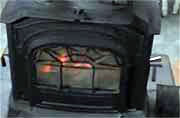
SATURDAY, Feb. 8, 2014 (HealthDay News) — Although many people use indoor and outdoor wood heaters to save money on fuel costs, burning wood to stay warm during the cold winter months might not be cost-efficient, according to the U.S. Environmental Protection Agency.
The agency also cautioned that smoke from older wood stoves might pose a serious health threat by increasing air pollution from soot and toxic pollutants. Soot, also known as fine particle pollution, has been linked to a number of health problems, including heart attacks, strokes and asthma.
The EPA explained in an agency news release that old, uncertified wood stoves give off more air pollution than pellet or gas heaters. In addition, updated EPA-certified wood stoves use one-third less wood than older models and produce up to 60 percent less air pollution while generating the same amount of heat.
EPA experts also said most hydronic heaters, which usually burn wood outside a home to heat water that is piped inside, are less efficient than other home-heating appliances. Some of these heaters might also produce an excessive amount of smoke, which can negatively affect neighbors.
The EPA established a program in which manufacturers can voluntarily make cleaner versions of hydronic heaters. The newer models resulting from this program are roughly 90 percent cleaner than older appliances.
There are about 10 million wood stoves and more than 240,000 hydronic heaters in the United States, the EPA said in the news release. The agency is encouraging change-out programs that would assist consumers in trading in their old, inefficient wood-burning appliances for newer models.
The EPA also issued a proposal to update standards for new wood stoves and heaters. Under these revised guidelines, the next generation of appliances would be an estimated 80 percent cleaner than the models currently being made.
A public hearing is scheduled to take place on Feb. 26 in Boston. The EPA said it hopes to get the public’s input on its proposal.
In order to burn wood more safely and efficiently, the EPA also provided the following tips:
- Burn only well-seasoned wood.
- Never burn trash or garbage.
- Never burn demolition debris.
More information
The U.S. Fire Administration offers more tips for fireplace and home fire safety.
Copyright © 2026 HealthDay. All rights reserved.

